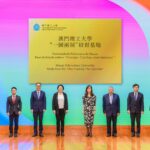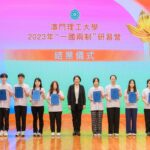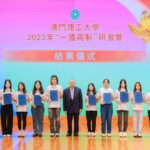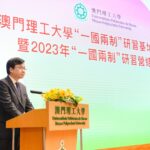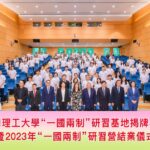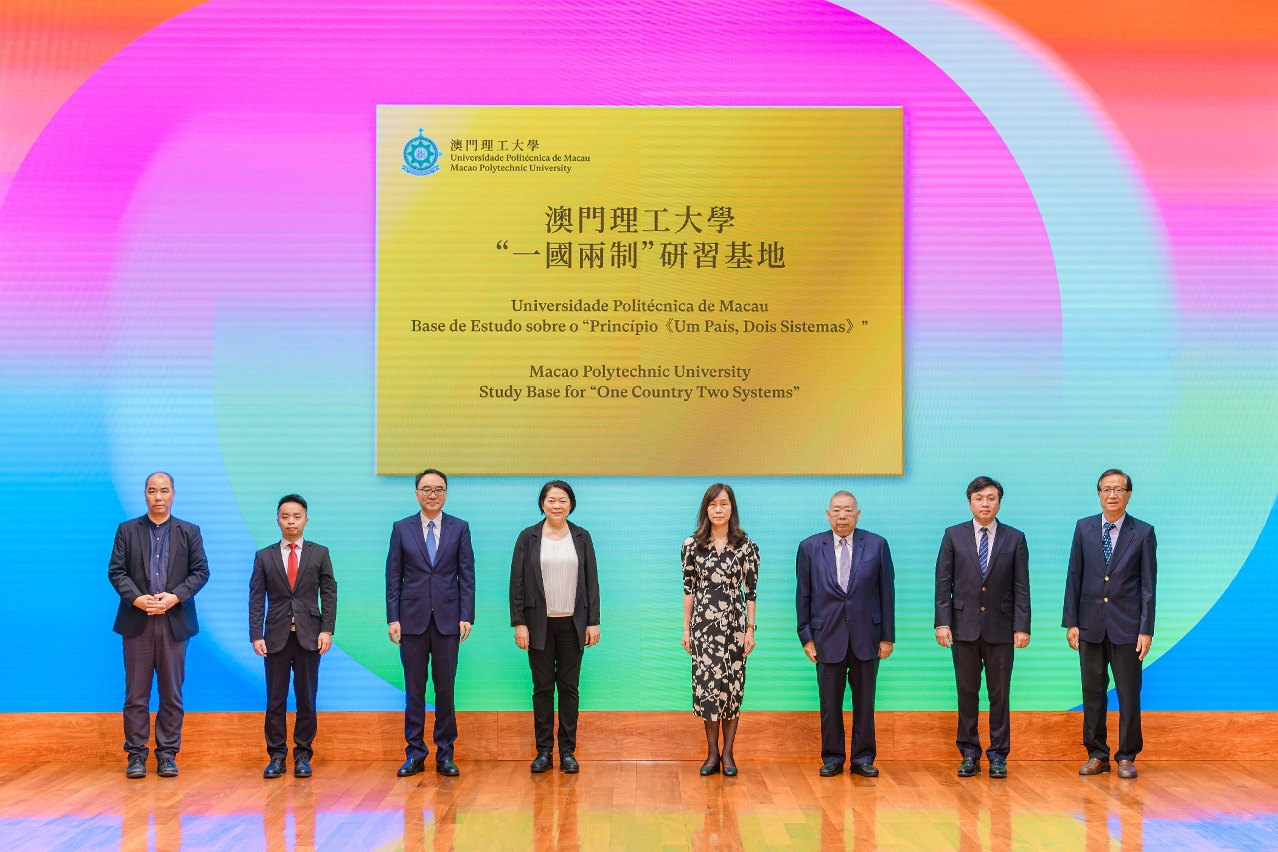 MPU launched “One Country, Two Systems” Study Base to deepen education of “loving the motherland and loving Macao”.
MPU launched “One Country, Two Systems” Study Base to deepen education of “loving the motherland and loving Macao”.
In order to cooperate with the policy implementation of the Macao SAR government, deepen the policy plan of education of “loving the motherland and loving Macao”, promote quality development of an integrated tourism and leisure industry, and enrich the connotation of Macao as a world tourism and leisure centre, the “One Country, Two Systems” Study Base of Macao Polytechnic University (MPU) grand inauguration was held at the University at 10 am on 15th July 2023. The Study Base aims to cultivate patriotism in youth on all fronts, develop national education and tourism in a synergistic manner, and play the role of linking cross-disciplinary fields in an interlocking mechanism.
The grand inauguration ceremony of the MPU “One Country, Two Systems” Study Base was officiated by the Secretary for Social Affairs and Culture, Ao Ieong U; Deputy Director of the Liaison Office of the Central People’s Government in the MSAR, Yan Zhichan; Vice President of the Legislative Assembly of MSAR and the President of the MPU Council, Chui Sai Cheong; Director of the Education and Youth Affairs Department of the Liaison Office of the Central People’s Government in the MSAR, Li Xuefei; Rector of MPU, Im Sio Kei; Deputy Director of Education and Youth Development Bureau of MSAR, Teng Sio Hong; Vice President of the Chinese Educators Association of Macau, Ao U Hong; and Vice Chairman of the Supervisory Board of the Macao Catholic Schools Association, Leong Su Weng; along with 100 other guests and participants from 20 mainland universities and various sectors of the community, making for a very lively event.
Rector of MPU, Professor Im Sio Kei, stated in his speech that in order to cooperate with the policy implementation of the Macao SAR government, MPU launched the “One Country, Two Systems” Study Base in the theme of national education to cultivate patriotism in youth on all fronts. At the same time, the two-way exchange of Macao students to the Mainland and Mainland students to Macao will become a new trend for inheriting the spirit of “loving the motherland and loving Macao”, and MPU will strive to build this series of activities into a national academic brand. The “One Country, Two Systems” Study Base will launch study programmes targeting young students and disseminate the experience of successful implementation of “one country, two systems” in Macao through activities such as seminars, workshops, field visits and inspections. Through these events, the Study Base aims to give young students from all over the nation a deeper understanding of the close relationship between Macao and the motherland, and the rich connotation of “one country, two systems”, so as to deepen their sense of national pride, patriotism and sense of responsibility in building a strong country, and to integrate into the building of the nation and community, thus contributing to the long-term prosperity and stability of the country.
At the inauguration ceremony, the closing ceremony of the 2023 “One Country, Two Systems” Study Camp was concurrently held, and certificates were presented to the participating teachers and students by the officiating guests. The “One Country, Two Systems” Study Camp includes a series of themed academic lectures, workshops as well as cultural field visits. The keynote lectures focused on the social development, economic system, the Basic Law, association development as well as youth development in Macao, analysing the positioning and strategies of Macao’s socio-economic development from different perspectives, and discussed the successful implementation of “one country, two systems” with multiple examples.
Teachers and students who participated in the “One Country, Two Systems” Study Camp spoke highly of it, stating that it has provided them with a new perspective on understanding the development of Macao society. The thematic academic lectures and field visits have also allowed them to interpret the connotation of “one country, two systems” from a much richer perspective, and to gain a deeper understanding of this great initiative which encapsulates Chinese wisdom.
The leading teacher from Tongji University said that through the academic lectures and thematic academic field visits she felt the prosperity and development of Macao after its return to the motherland, which has deepened her understanding of Macao’s governance wisdom in integrating Chinese and Western cultures, and the understanding of the core values of “loving the motherland and loving Macao”. At the same time, the dynamic research results of “one country, two systems” can be seen everywhere in the public areas of the campus, such as the bookstore and memorial hall, providing rich channels for comprehending “one country, two systems”.
Dong, from Harbin Institute of Technology, said that through the study camp they have gained a better understanding of how to promote the building of a strong nation and implementation of the principle of “one country, two systems” comprehensively, accurately and firmly so as to safeguard Macao’s social stability and economic development, thus enabling Macao to better integrate into the national development and make greater contributions to the great rejuvenation of the Chinese nation.
Xu, from Guangdong University of Foreign Studies, explained that the “One Country, Two Systems” Study Camp has adopted a theoretical and practical learning mode which allows in-depth understanding of the successful implementation of “one country, two systems” in Macao. While experiencing higher education in Macao, she has also experienced Macao’s unique world cultural heritage. These substantial projects and happy smiling faces all illustrate the leading power of cogitation and vividly interpret the correctness and necessity of “one country, two systems”.


